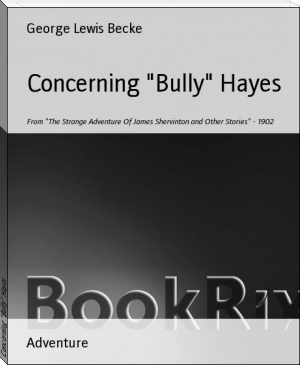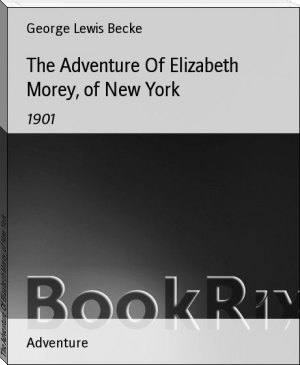Ridan The Devil And Other Stories, George Lewis Becke [best sci fi novels of all time txt] 📗

- Author: George Lewis Becke
Book online «Ridan The Devil And Other Stories, George Lewis Becke [best sci fi novels of all time txt] 📗». Author George Lewis Becke
As quickly as possible we got lights and examined the gentry lying about on the deck. One of them was still unconscious, the rest were pretty badly mauled about in the tussle; and Mani suggested that we had better drop them overboard to save further trouble. Her blood was up, and she was full of fight; but Hannah merely laughed, and told her not to be such a _pun fia ai_ (tiger cat).
Showing a light, we hailed the Frenchmen's boat, and told them to come alongside again.
'If you don't look smart we'll drop these five men overboard. So hurry up.'
The gentleman from 'Barcelon'--who was certainly possessed of inimitable cheek--after telling us to go to Hades, added that he had but one oar in the boat, the others had gone adrift. So we had to dump our prisoners into our own boat, and pull out to the other. Then, while Alan and I covered those in the Frenchmen's boat, Hannah and two hands flung our prisoners out of our boat into their own. Their leader took matters very coolly, cursed his returning comrades freely as cowards, and then had the face to ask us for some oars.
Then Hannah, who, we now found, spoke French, boiled over. Jumping into the other boat, he seized the gentleman from Barcelona by the throat with his left hand and rapidly pounded his face into a pulp with his right.
Whilst Hannah was taking his satisfaction out of the big man, we struck some matches and examined the rest of the crowd in the boat. One man, we saw, was badly wounded, Mani having sent two bullets through his right shoulder and one through his thigh; another had his cheek cut open, but whether this was caused by a bullet or not I could not tell. I, being young and green, felt very pitiful and wanted Hannah to bring the badly-wounded man on board; but he, like a sensible man, said he would see me hanged first, and that we ought to shoot the lot of them.
But, anyway, we gave them three oars, and then pushed clear of their boat just as another rain squall came seething along.
At dawn we saw them, about two miles abeam of us, pulling slowly in towards Pentecost.
We heard afterwards that they were sighted by the Sydney steamer _Ripple_ Captain Ferguson, off Torres Island, in the Banks Group. Most probably they abandoned the idea of stopping at Leper's Island, where they would not be safe from recapture by the French cruisers, and were then making for the Solomons. But that they ever reached there is doubtful; or, if they did, they were probably eaten by the natives. The boat, we heard, they had captured from a German vessel loading nickel ore at one of north-eastern ports of New Caledonia, and they had then raided a small settlement on the coast and obtained some arms and provisions. Long afterwards I was told that their leader was a sailor who was serving a life sentence for killing his mistress at La Ciotat, in the South of France.
It is quite possible, however, that they may have been picked up by an American whale-ship making northwards to the Moluccas from the New Zealand ground. In those days there were quite thirty ships still remaining of the once great American whaling fleet, which traversed the Pacific from one end to the other.
Publisher's Note.--The half-caste Alan mentioned in this
story is the same 'Alan' who so frequently figures in Mr
Becke's tales in _By Reef and Palm_, and his subsequent
books.
THE SOUTH SEA BUBBLE OF CHARLES DU BREIL
Less than a year ago news was received of the arrival in Noumea, in New Caledonia, of the remainder of a party of unwashed visionaries, calling themselves the 'United Brotherhood of the South Sea Islands.' A year before they had sailed away from San Francisco in a wretched old crate of a schooner, named the _Percy Edward_ (an ex-Tahitian mail packet), to seek for an island or islands whereon they were to found a Socialistic Utopia, where they were to pluck the wild goat by the beard, pay no rent to the native owners of the soil, and, letting their hair grow down their backs, lead an idyllic life and loaf around generally. Such a mad scheme could have been conceived nowhere else but in San Francisco or Paris.
In the latter city such another venture, but founded on more heroic lines of infatuation, was organised eighteen years ago by the late Charles du Breil, Marquis de Rays, and the results ought to have made the American enthusiasts reflect a little before they started. But having got the idea that they might sail on through summer seas till they came to some land fair to look upon, and then annex it right away in the sacred name of Socialism (and thus violate one of the principal articles of their faith), they started--only to be quickly disillusionised. For there were no islands anywhere in the two Pacifics to be had for the taking thereof; neither were there any tracts of land to be had from the natives, except for hard cash or its equivalent. The untutored Kanakas also, with whom they came in contact, refused to become brother Socialists and go shares with the long-haired wanderers in their land or anything else. So from island to island the _Percy Edward_ cruised, looking more disreputable every day, until, as the months went by, she began to resemble, in her tattered gear and dejected appearance, her fatuous passengers. At last, after being chivvied about considerably by the white and native inhabitants of the various islands touched at, the forlorn expedition reached Fiji. Here fifty of the idealists elected to remain and work for their living under a government which represented the base and brutal institution of Monarchy. But the remaining fifty-eight stuck to the _Percy Edward_ and her decayed salt junk, and stinking water, and their beautiful ideals; till at last the ship was caught in a hurricane, badly battered about, lost her foremast, and only escaped foundering by resting her keel on the bottom of Noumea Harbour. Then the visionaries began to collect their senses, and denounced the _Percy Edward_ and the principles of the 'United Brotherhood' as hollow frauds, and elected to go ashore and get a good square meal.
The affair recalls the story of the ill-starred colony of 'Nouvelle France,' which was given the tacit support of the French Government, the blessing of the Church, and the hard-earned savings of the wretched dupes of French, Italian and Spanish peasantry who believed in it--until it collapsed, and many of them died cursing it and themselves on the fever-stricken shores of New Ireland.
Early in 1879 an enticing prospectus appeared, signed 'Ch. du Breil, Director and Founder of the Free Colony of Port Breton in Oceania.' In this precious document the marvellous fertility, the beautiful scenery, and the healthy climate of the island of New Ireland (Tombara) were described at length, while the native inhabitants came in for much unqualified praise as simple children of nature, who were looking forward with rapture to the advent of the colonists, and to the prospect of becoming citizens of the Free Colony, and being recognised as Frenchmen, and helping the settlers cultivate the vine, etc., and being admitted into the fold of Christianity.
Perhaps Du Breil believed in his impossible scheme--many people said so, when, some years afterwards, he was sentenced to two years' imprisonment and a fine of thirty thousand francs for his share in it. But if he did not, the French peasantry did, and money came pouring in. Ignorant people sold their little all and gathered together at Marseilles and other ports, where ships waited to convey them to the new paradise; in all, nearly half a million pounds was subscribed. Then away went emissaries to the southern parts of Italy, where the ignorant agricultural labourers bit freely and were caught wholesale. In their case, however, the prospectus varied from that issued in France, which was specially designed to ensnare small capitalists, tradespeople and farmers, as well as the poorer peasants. The various religious fraternities in France, which hoped to benefit financially by their advocacy, boomed the scheme, and sermons were preached on the philanthropy of M. le Marquis, who, like Law and Blount, was nothing if not magnificent. By the time the _Chandernagore_, the first ship, had sailed from Flushing, elaborate plans were issued of the new city, with its parks and public buildings, and noble wharves and boulevards aglow with life and excitement; while the religious wants of the settlers had not been neglected, for cathedrals and churches figured conspicuously. Also, it was indicated by a carefully-prepared descriptive pamphlet, that gold and diamonds and such other things only wanted looking for in the surrounding islands, where they could be obtained in quantities sufficient to satisfy the most avaricious.
The _Chandernagore_ carried only eighty colonists, all males, and, flying the Liberian flag, after a long passage she reached the Lachlan Islands, in the South Pacific, where sixteen of them elected to stay, charmed by the beauty of the place and the unconventional manners of the native women. Of these sixteen, five died from fever, and of the remainder two were killed and eaten by natives of other islands, and the rest were rescued by Australian and German trading vessels. The _Chandernagore_ proceeded on her voyage, and Port Breton was reached at last. It is on the south end of the great island of New Ireland, and with, perhaps, the exception of the Falkland Islands, or the Crozets, or London in the month of November, the most sodden, dank, squashy and appalling place on the globe. The day after the ship anchored it began to rain, and, as it showed no signs of clearing up at the end of three weeks, the captain was besought to look out for another site for the city where it was not quite so wet. He took them to a better





Comments (0)